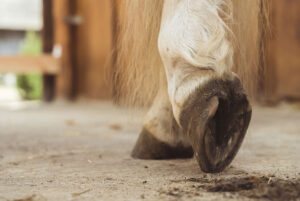Buying Better Hay — Stacks of Decisions
- Topics: Article, Farm and Barn, Hay, Healthy Farm Management, Nutrition, Nutrition Basics
Horses eat hay. But why? How does it work? What happens to the hay after it passes the horse’s teeth? Knowing how hay functions in the horse’s body will help you make better hay choices in the future.
Robert Van Saun, DVM, PhD, an extension veterinarian and associate professor at the University of Pennsylvania, begins his forage feeding lectures with an anatomy lesson. Hay is picked up by the lips and conveyed by the tongue to the molars in the back of the mouth, which are behind where the bit lays. These molars grind the hay into small pieces and mix it with saliva to form a wad of the proper size to move down the esophagus into the stomach. Therefore, good teeth are a requirement for eating hay. That is why adjustments need to be made for older horses with dental problems to get the fiber they need, but might not have the tools to process. This is also why attention needs to be paid to correct dental care throughout the horse’s life. Finally, grinding away at hay meets the horse’s psychological need to chew. The desire to chew will lead to eating undesirable objects if forage is not available.
The hay chewing in the mouth has provided enough saliva to lubricate the way. Inadequate chewing can lead to inadequate salivation and a lack of moisture in the stomach, which in turn can lead to impaction and gas.
Hay goes through the stomach and the small intestine mostly undigested. The large intestine, all 50-60 feet of it, absorbs water and digests the hay. Horses process hay through fermentation, which is why they’re classified as “hindgut fermenters.” This is also one reason why so much can go wrong with a horse’s diet so quickly
Create a free account with TheHorse.com to view this content.
TheHorse.com is home to thousands of free articles about horse health care. In order to access some of our exclusive free content, you must be signed into TheHorse.com.
Start your free account today!
Already have an account?
and continue reading.
Related Articles
Stay on top of the most recent Horse Health news with


















